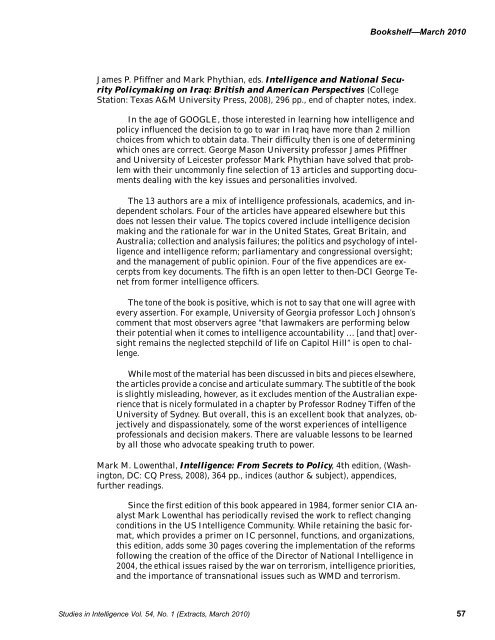Studies in Intelligence - The Black Vault
Studies in Intelligence - The Black Vault
Studies in Intelligence - The Black Vault
You also want an ePaper? Increase the reach of your titles
YUMPU automatically turns print PDFs into web optimized ePapers that Google loves.
Bookshelf—March 2010<br />
James P. Pfiffner and Mark Phythian, eds. <strong>Intelligence</strong> and National Security<br />
Policymak<strong>in</strong>g on Iraq: British and American Perspectives (College<br />
Station: Texas A&M University Press, 2008), 296 pp., end of chapter notes, <strong>in</strong>dex.<br />
In the age of GOOGLE, those <strong>in</strong>terested <strong>in</strong> learn<strong>in</strong>g how <strong>in</strong>telligence and<br />
policy <strong>in</strong>fluenced the decision to go to war <strong>in</strong> Iraq have more than 2 million<br />
choices from which to obta<strong>in</strong> data. <strong>The</strong>ir difficulty then is one of determ<strong>in</strong><strong>in</strong>g<br />
which ones are correct. George Mason University professor James Pfiffner<br />
and University of Leicester professor Mark Phythian have solved that problem<br />
with their uncommonly f<strong>in</strong>e selection of 13 articles and support<strong>in</strong>g documents<br />
deal<strong>in</strong>g with the key issues and personalities <strong>in</strong>volved.<br />
<strong>The</strong> 13 authors are a mix of <strong>in</strong>telligence professionals, academics, and <strong>in</strong>dependent<br />
scholars. Four of the articles have appeared elsewhere but this<br />
does not lessen their value. <strong>The</strong> topics covered <strong>in</strong>clude <strong>in</strong>telligence decision<br />
mak<strong>in</strong>g and the rationale for war <strong>in</strong> the United States, Great Brita<strong>in</strong>, and<br />
Australia; collection and analysis failures; the politics and psychology of <strong>in</strong>telligence<br />
and <strong>in</strong>telligence reform; parliamentary and congressional oversight;<br />
and the management of public op<strong>in</strong>ion. Four of the five appendices are excerpts<br />
from key documents. <strong>The</strong> fifth is an open letter to then-DCI George Tenet<br />
from former <strong>in</strong>telligence officers.<br />
<strong>The</strong> tone of the book is positive, which is not to say that one will agree with<br />
every assertion. For example, University of Georgia professor Loch Johnson’s<br />
comment that most observers agree “that lawmakers are perform<strong>in</strong>g below<br />
their potential when it comes to <strong>in</strong>telligence accountability … [and that] oversight<br />
rema<strong>in</strong>s the neglected stepchild of life on Capitol Hill” is open to challenge.<br />
While most of the material has been discussed <strong>in</strong> bits and pieces elsewhere,<br />
the articles provide a concise and articulate summary. <strong>The</strong> subtitle of the book<br />
is slightly mislead<strong>in</strong>g, however, as it excludes mention of the Australian experience<br />
that is nicely formulated <strong>in</strong> a chapter by Professor Rodney Tiffen of the<br />
University of Sydney. But overall, this is an excellent book that analyzes, objectively<br />
and dispassionately, some of the worst experiences of <strong>in</strong>telligence<br />
professionals and decision makers. <strong>The</strong>re are valuable lessons to be learned<br />
by all those who advocate speak<strong>in</strong>g truth to power.<br />
Mark M. Lowenthal, <strong>Intelligence</strong>: From Secrets to Policy, 4th edition, (Wash<strong>in</strong>gton,<br />
DC: CQ Press, 2008), 364 pp., <strong>in</strong>dices (author & subject), appendices,<br />
further read<strong>in</strong>gs.<br />
S<strong>in</strong>ce the first edition of this book appeared <strong>in</strong> 1984, former senior CIA analyst<br />
Mark Lowenthal has periodically revised the work to reflect chang<strong>in</strong>g<br />
conditions <strong>in</strong> the US <strong>Intelligence</strong> Community. While reta<strong>in</strong><strong>in</strong>g the basic format,<br />
which provides a primer on IC personnel, functions, and organizations,<br />
this edition, adds some 30 pages cover<strong>in</strong>g the implementation of the reforms<br />
follow<strong>in</strong>g the creation of the office of the Director of National <strong>Intelligence</strong> <strong>in</strong><br />
2004, the ethical issues raised by the war on terrorism, <strong>in</strong>telligence priorities,<br />
and the importance of transnational issues such as WMD and terrorism.<br />
<strong>Studies</strong> <strong>in</strong> <strong>Intelligence</strong> Vol. 54, No. 1 (Extracts, March 2010) 57





![Combat Support in Korea [270 Pages] - The Black Vault](https://img.yumpu.com/49796461/1/190x71/combat-support-in-korea-270-pages-the-black-vault.jpg?quality=85)











